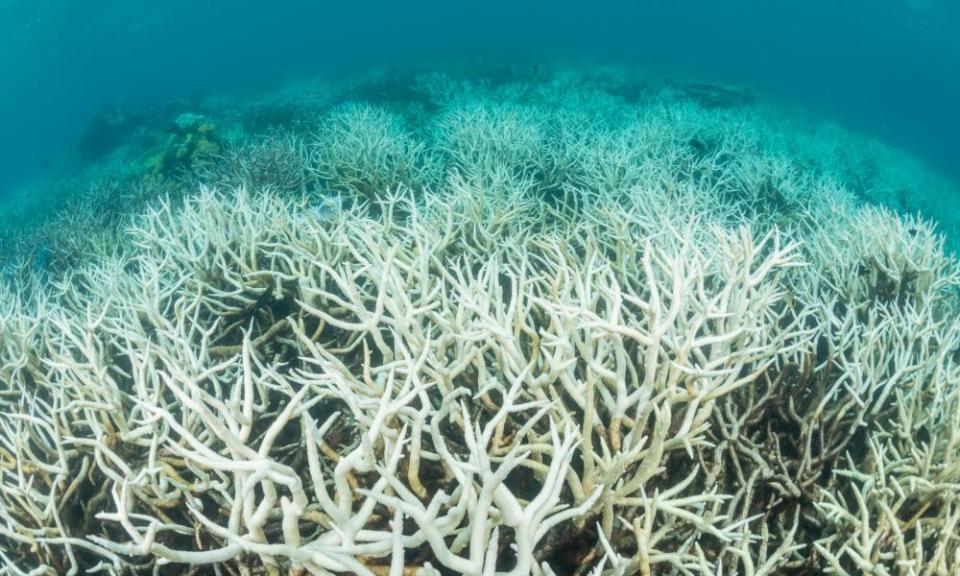‘Confronting’: Great Barrier Reef faces frequent extreme coral bleaching at 2C heating, research finds

Parts of the Great Barrier Reef would be hit with extreme levels of coral bleaching five times each decade by the middle of this century if global heating was kept just below 2C, according to ‘“confronting” new research.
Even under the most ambitious scenario where heating is kept to 1.5C, coral bleaching strong enough to kill corals would hit somewhere on the reef more than three times a decade, the study predicts.
Allowing global heating to go beyond 2C would bring unprecedented levels of heat stress.
Related: Great Barrier Reef: how a spectacular coral spawning event is helping to breed heat-tolerant corals
“It’s hard to imagine what that would look like” said Prof Peter Mumby, one of the study’s authors.
Using the latest climate models, the scientists added extra information about the depth, tides and winds around reefs to give a more detailed projection of how much bleaching could occur over different areas.
Lead author of the study, Jen McWhorter, said the modelling suggested warming above 2C would be “very, very bad” for corals along the reef.
But she said keeping temperatures to 1.5C – the most ambitious target in the Paris climate change agreement – meant corals were exposed to far less heat stress.
“The stress we see above 2C under these higher [greenhouse gas] emissions scenarios is three to four times greater than present day conditions,” said McWhorter, who has a combined role at the University of Exeter and the University of Queensland.
Coral reefs are considered one of the most sensitive ecosystems to global heating. If corals sit in warmer than average water for too long, they lose the algae that provides much of their colour and nutrients, leaving a visible white skeleton.
If water temperatures are not too severe, then corals can recover from bleaching. Higher temperatures or prolonged exposure can cause coral death.
The Great Barrier Reef, off the Queensland coast, experienced three mass outbreaks of coral bleaching in 2016, 2017 and 2020.
University of Queensland’s Prof Peter Mumby, a co-author of the study said the findings were “confronting”.
“It tells us that even with the most optimistic scenarios, we are still looking at one bleaching event somewhere every three years.”
Published in the journal Global Change Biology, the study found while all areas of the reef would see increased risk from bleaching as emissions went up, the central and southern areas would fare slightly worse.
Mumby said scientists were busy on research to understand if, and how, different species of coral might naturally adapt to warmer temperature.
The study suggests if greenhouse gas emissions were held to levels that would keep global warming below 2C or at 1.5c, then the frequency of coral bleaching peaks just before the year 2060 and then falls slightly.
Mumby said he thought coral reefs “could still persist” with global heating of 1.5C, but the diversity of corals would not be at levels seen today.
But as heating hit 2C, bleaching would hit parts of the reef “every two to three years” and he said “it’s hard to imagine what that would look like.”
Related: Great Barrier Reef’s future dealt blow as study finds only 2% escaped coral bleaching
The Great Barrier Reef has seen five mass bleaching events – 1998, 2002, 2016, 2017 and 2020 – all caused by rising ocean temperatures driven by global heating.
One study earlier this month found that since 1998, more than 98% of individual reefs along the Great Barrier Reef had been hit by bleaching at least once.
Prof Terry Hughes, of James Cook University and a leading expert on the effects of global heating of coral reefs, said: “The trajectory is already under way and we can see damage from only one degree of global warming. We are hading for 1.5C, which is unavoidable.
“Without a climate model, we know that warming has triggered three events and that has several damaged 80% of reefs. This study shows that will be ongoing, but the end point depends on how much warmer we are prepared to allow it to go.”

 Yahoo Finance
Yahoo Finance 